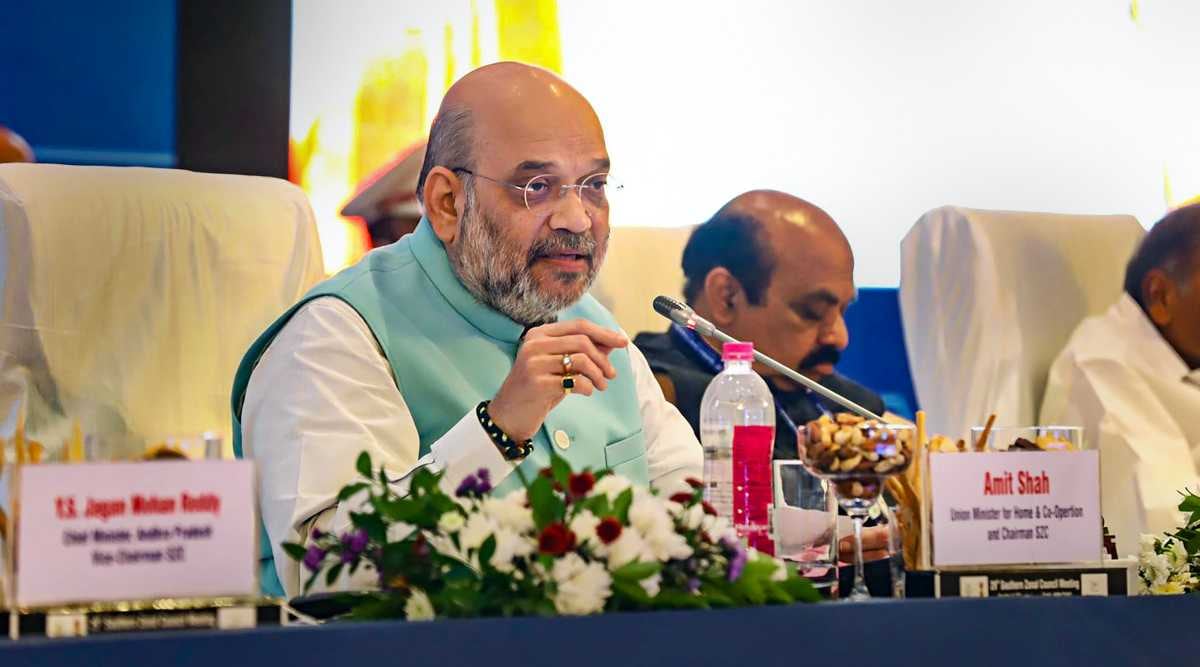 Union Home Minister Amit Shah chairs the Southern Zonal Council meeting in Tirupati, Sunday, Nov. 14, 2021. (PTI Photo)
Union Home Minister Amit Shah chairs the Southern Zonal Council meeting in Tirupati, Sunday, Nov. 14, 2021. (PTI Photo) India’s development cannot be imagined without the very important contribution of the states of southern India, Home Minister Amit Shah said Sunday.
“The ancient culture, traditions and languages of the states of southern India enrich India’s culture and ancient legacy. India’s development cannot be imagined without the very important contribution of the states of southern India,” Shah said while addressing the 29th meeting of the Southern Zonal Council at Tirupati in Andhra Pradesh.
The meeting of the council – comprising the states of Andhra Pradesh, Tamil Nadu, Karnataka, Kerala and Telangana, and the Union Territories of Puducherry, Lakshadweep and Andaman & Nicobar Islands – was hosted by Andhra Pradesh Chief Minister Jagan Mohan Reddy and was attended by his counterparts from the respective regions, besides top officials.
Shah asked states to speed up the rate at which the second dose of vaccination against Covid-19 is administered and said chief ministers should monitor the process. He also asked states to crack down on narcotics networks even as he asked them to submit their suggestions for changes in the Indian Penal Code and Criminal Procedure Code for effective management of law and order.
He said states should have zero tolerance towards crimes against women and children. He also asked them to create a directorate of prosecution in their police departments to ensure that better investigations are carried out.
He also asked all states to establish at least one forensic science college with a syllabus in the local language, so that they can have trained manpower which can meet the needs of forensic investigation.
Shah also said that the Modi government respects local cultures and languages.
“The Modi government respects all of India’s regional languages and, therefore, at today’s Southern Zonal Council meeting, facilities have been made for translation into the languages of all states that are in the Southern Zonal Council,” Shah said at the meeting.
Zonal Council meetings are avenues to sort out issues between the Centre and states as well as those between states. The Ministry of Home Affairs (MHA) said 40 of the 51 pending issues were resolved in Sunday’s meeting. “Zonal Councils are advisory bodies in nature and yet we have been able to successfully solve many issues. The Zonal Councils provide an opportunity for interaction at the highest level amongst members,” the MHA quoted Shah as having said.
An MHA statement said the Home Minister said that he would be happy to see delegates feeling free to speak in the language of their state in the future.
The minister informed that in the last seven years, 18 Zonal Council meetings had been held, compared to which very few meetings were held earlier. “Now meetings of different Zonal Councils are convened regularly and this could happen only with the cooperation of all state governments as well as Central Ministries and departments,” the MHA quoted Shah as saying.
Shah lauded the cooperation of states in fighting the pandemic. “We have been able to achieve 111 crore vaccine doses as of today during the Covid-19 pandemic. This is a big achievement and an example of cooperative federalism. It is Prime Minister Narendra Modi’s vision to leverage cooperative and competitive federalism to achieve all round growth in the country,” Shah was quoted as saying.
According to MHA, the Zonal Councils take up issues involving the Centre and states as well as one or many states falling in the Zone. The Zonal Councils, thus, provide a forum for resolving disputes and irritants between the Centre and states and also among many states in the Zone.
The Zonal Councils discuss a broad range of issues, which include boundary related disputes, security, infrastructure related matters like road, transport, industries, water, and power etc., as well as matters pertaining to forests and environment, housing, education, food security, tourism and transport.
- The Indian Express website has been rated GREEN for its credibility and trustworthiness by Newsguard, a global service that rates news sources for their journalistic standards.

